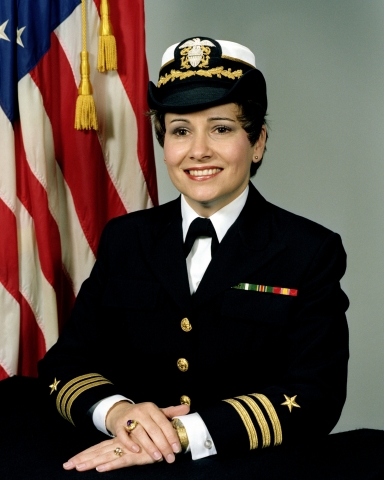When U.S. Naval Captain, Kathleen Donahue Bruyere, graduated from Chestnut Hill College in 1966, the world she was ready to embark on was much different than the world she would leave upon her death in September 2020. That is largely because of Bruyere and her like-minded contemporaries, who committed themselves to breaking barriers and shattering glass ceilings for women everywhere.
 According to Bruyere’s sister, Lucia Donahue O’Dwyer, women’s rights were “extremely important” to Bruyere. As was the military, as Bruyere, along with her five siblings, were raised in an Army family, traveling from all around the U.S. to Germany to Greece depending on where her father was stationed at the time. Life in a military family wasn’t always easy at times, recounted O’Dwyer, but for Bruyere it was fulfilling and instilled in her at a young age the kind of life and career she wanted for herself. Upon completing her high school education in Germany, Bruyere embarked on the first chapter of that journey, enrolling at Chestnut Hill College.
According to Bruyere’s sister, Lucia Donahue O’Dwyer, women’s rights were “extremely important” to Bruyere. As was the military, as Bruyere, along with her five siblings, were raised in an Army family, traveling from all around the U.S. to Germany to Greece depending on where her father was stationed at the time. Life in a military family wasn’t always easy at times, recounted O’Dwyer, but for Bruyere it was fulfilling and instilled in her at a young age the kind of life and career she wanted for herself. Upon completing her high school education in Germany, Bruyere embarked on the first chapter of that journey, enrolling at Chestnut Hill College.
Still an all-women's school at the time, Bruyere chose Chestnut Hill and began her college career commuting to the school from Overbrook, Philadelphia, where she lived with her aunt and uncle. According to her longtime friend, Suzanne Stanton Regan ’66, Bruyere was “so outgoing” and never afraid to “talk to anybody.” Bruyere’s personality was infectious as she made fast friends and got to know many of her CHC classmates. Following her graduation, she continued to be involved at the College, often speaking at events for current students and attending her own reunions. CHC was an important part of Bruyere’s life. As someone who had always been interested in women’s rights, attending an all-women's college provided a platform and launching pad for the accomplishments Bruyere would achieve in her near 30-year military career.
The daughter of an Army officer, Bruyere knew exactly what she wanted to do with her life. So, upon her graduation from Chestnut Hill, Bruyere immediately enlisted in the Navy. There she began a successful career, slowly climbing the ladder as one of the most highly regarded women in the service at the time. In 1968, she married a naval lieutenant but instead of resigning from active duty as was considered the “popular convention,” according to the Orlando Sentinel, Bruyere retained her post. She and her husband became the first officer couple to attend the Naval War College in Rhode Island. Bruyere’s career took her from campus-recruiting in the early 1970s to the Bureau of Naval Personnel in Washington, DC. It was there that, in her own words, Bruyere got her “first look at the big picture, the politics of things, the bureaucracy, how decisions were made,” of the U.S. Armed Forces. Through watching the action, Bruyere became inspired by all the positive change being brought about not just in the military, but also by the burgeoning women’s movement overall. It was a movement that landed her on the cover of Time Magazine in 1976 - alongside such trailblazers as Betty Ford and Billie Jean King - and a movement that would see Bruyere make her indelible mark just a few years later.
As Bruyere continued rising through the Navy’s top ranks, including in 1975, being named the first-ever female flag secretary, a position that allowed her to manage staff for an admiral in charge of nine Pacific training commands, she found herself at a crossroads. Despite being highly regarded in the Navy, Bruyere was limited in just how high a rank she could aspire to achieve due to the Women’s Armed Services Integration Act of 1948. Signed into law by then-President Harry Truman, during World War II, the act gave service secretaries the right to discharge women from the military without cause, restricted women from flying aircraft in combat, and, as was most important in Bruyere’s case, restricted women from being able to command their own ship during wartime. Because of this act, Bruyere and other qualified female naval officers were unable to get due promotions and command assignments. Navy regulations at the time, prohibited these women from going to sea, but they also made it so that for an officer to command a shore unit, they had to be able to go to sea. It was a Catch 22 that Bruyere simply was unwilling to accept.
So, in 1977, Bruyere and five fellow sailors took a significant career risk by suing the U.S. government, specifically the Department of Defense. The suit resulted in a landmark Civil Rights victory as the act was declared unconstitutional. While Bruyere herself decided a career at sea after so many years on land wasn’t for her, her actions paved the way for thousands of women since, to have an opportunity to command a ship in a way they never did before. The actions also allowed Bruyere to rise to the status of Captain, a rank she held up until her eventual retirement from the Navy in 1994. Before she retired though, Bruyere continued to make her mark. She became the first female executive officer of the Navy’s recruiting district headquartered in New York and helped conduct a study that addressed sexism in the Navy, opened up more jobs on-ship for women, allowed women to command vessels at sea, and created a new women’s policy office, which Bruyere would helm. Before retiring, Bruyere also enjoyed a stint as the Commanding Officer of the Navy Recruit Training Command in Orlando, where she helped create the Navy’s first-ever co-ed boot camp.
“There is nothing today’s women cannot do,” Bruyere said in an interview with the San Diego Veterans Magazine in March 2020. “We need them to keep charging ahead.”
Just as Bruyere did all those years ago, when her trailblazing efforts challenged the system and created change for the better.
- Marilee Gallagher '14







